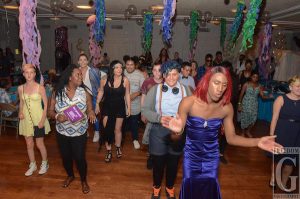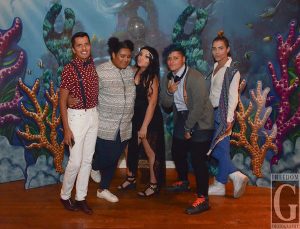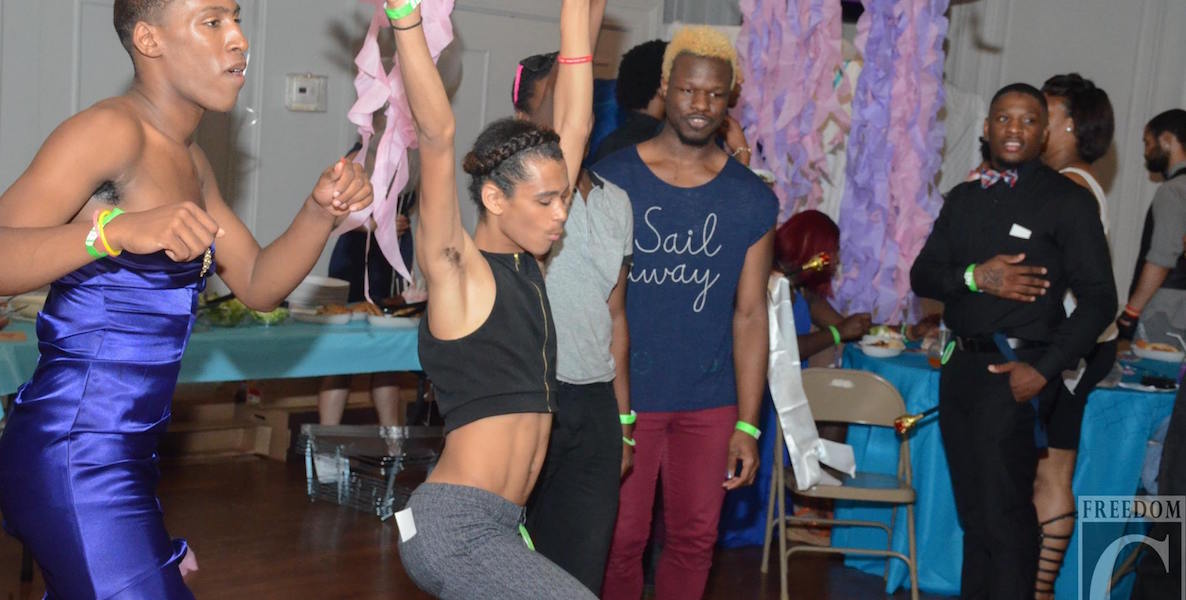When Manny Coreano arrived at the William Way Center on the night of June 25th, he had to admit that he was scared. He started to dance with his friends, trying to focus on the music and the fashion and the “under the sea” decor on the walls and ceilings—anything other than his fear, and that of every person in the room, there for a Latin@ LGBTQ alternative prom. Exactly two weeks prior, 49 mostly Latino LGBTQ people were gunned down in an Orlando nightclub while doing the same thing—dancing with each other.
“Ever since Orlando happened, I go to a store and fear for my life,” Coreano, 19, says. “I was at Pride fearing for my life. So even at this alternative prom I was scared somebody was going to come in and ruin that night. But after a while I let the fear go and I just danced for Orlando.”
The annual alternative prom was, this year, an especially welcome celebration put on by GALAEI, a social justice and support group for LGBTQ Latin@s based in North Philly. The 26-year-old organization, started at the height of the AIDS epidemic, provides free and confidential HIV and STD testing, various advocacy opportunities and education information for Latino Philadelphians of all ages.They serve approximately 5,500 people per year through their various programming, all of which are free. One of its most visible programs is for youth, for whom safe and affirming spaces are scarce.
Back when GALAEI opened in the early 1990s, there was no culturally competent and language-sensitive information about testing, prevention, and treatment of HIV/AIDS for LGBT Latinos, specifically gay men, in Philadelphia. The group still offers free, confidential and personal STD screenings and HIV testing at their center in North Philadelphia as well as at two satellite campuses—one at Philly AIDS Thrift in South Philly and the other at Washington West in Center City—but their mission has broadened.
“I will be happy the day that we can say, ‘No we don’t need the prom anymore because every other prom creates a safe and affirming space for LGBTQ youth,'” says Cortes.
The group is increasingly focused on social justice issues that impact the LGBTQ Latin@ population, including criminal justice reform, policies surrounding LGBTQ asylum seekers and family reunification, and fighting poverty. (Between 30 and 43 percent of homeless youth served by drop in centers, outreach programs, and housing programs, identified as LGBTQ.) Along with the youth program, GALAEI also runs the TransHealth Information Project, the only peer-based support program for transgender individuals in Pennsylvania. TIP helps with an array of services for trans individuals from giving information on hormone therapy and legal name changes to helping trans people get jobs. (GALAEI programs are funded through various foundation grants.)
Last year, GALAEI moved from Center City to its new location on Norris Square in North Philly to further its mission of a community-oriented social justice organization. Almost all of the youth who utilize the various services at GALAEI live within walking distance or are a short bus ride away.
Francisco Cortes, the director of GALAEI’s youth program, says the Gayborhood in Center City may be a place where many LGBTQ Philadelphians find their communities, but that “realistically, queer Latin@s are not in Center City in the high rises.” Language issues and cultural differences keep some people from feeling accepted in other LGBTQ communities given their multiple layers of identity. “Many of these organizations are like ‘We only support LGBT issues,’ or ‘We only support Latino issues,’” Cortes says. “You have more issues than just your gay identity. I have kids that have been kicked out of homes or in deep poverty—we have to deal with those too.”
One recurring cultural component, for example, is religion. Like many Latin@s, Coreano came from a religious background and had to explore both his Latino and LGBT identity as part of his own journey. “I was raised Puerto Rican Pentecostal so it was mandatory for me to go to church every single day, not just on Sunday,” he says. “And I never even knew about the queer community when I started discovering the fact that I was gay. I didn’t know that there was even queer people that were like me.” With GALAEI in the midst of a heavily-Latino neighborhood, it helps to show LGBTQ Latin@s, particularly young people, that there is a community for them if they want it.

Without GALAEI, Coreano says he doesn’t think he would have survived. After leaving a “toxic family environment,” he had been homeless. GALAEI staff members helped him find a place to live in Divine Light, an LGBTQ wellness center and the city’s first LGBT housing shelter.
Overall, GALAEI serves between 60 and 80 youth, ages 13 to 24, at any given time through their various programs. They have one-on-one coaching, where youth meet with Cortes regularly (for some it’s weekly, while others meet biweekly or monthly) to help work through identity issues or anything else that may come up. Cortes also runs a youth group that meets weekly to discuss movies, current events, issues in school, among other things The programs themselves are largely determined by the kids’ own wants and needs. For example, Cortes is starting a LGBTQ Latin@ literature group because kids were complaining that there was not enough exposure to Latin@ LGBTQ authors in their school curricula. They are also offering new programs to help with job and college readiness.
But for most of the youth, the main event of the year is the prom. And for Cortes, it is one of the most important things he does—not because it serves an activist purpose, but because it is, simply, fun. (The prom is not only for Latin@ LGBTQ youth, but any LGBTQ youth and allies as well.) It is, according to Coreano, the only prom where everyone can proudly bring their partner of choice, something he says is rare in most high schools, whether because of school policies or fear of judgment by other students.
At 21 years, GALAEI’s Alternative Prom is the longest consecutively running prom in the nation. A ticket costs $10 (compared to some proms where tickets can be closer to $100), but they will not turn anyone away. “Every time people ask me why do you do the prom, I say, ‘Because they really need it,’” says Cortes. “I will be happy the day that we can say, ‘No we don’t need the prom anymore because every other prom creates a safe and affirming space for LGBTQ youth.’ Unfortunately that’s not the case this year and it hasn’t been the case for the last 21 years.”
Unlike other events at GALAEI, at the prom there are no pamphlets about HIV and STD testing; there are no calls for people to agree to participate in research studies; there are no political campaigns or handouts about activist causes with which the organization is involved.
“Even at this alternative prom I was scared somebody was going to come in and ruin that night,” Coreano says. “But after a while I let the fear go and I just danced for Orlando.”
“There are no spaces for them to just be fun and have fun,” says Cortes. “Yes, we’ll have condoms there at a table if they want to grab some or whatever, but this isn’t a trade show, this is a prom. We want them to not have to deal with all these pressures and all these sometimes very negative issues and stuff on this one night.”
The events in Orlando were on everyone’s mind at this year’s prom. Two weeks earlier, GALAEI members had learned of the shooting as they gathered for Philly’s Gay Pride Parade. Correano and others attended the City Hall vigil, and few days later, GALAEI held its own gathering at its North Philly center. They listened to music, cried, lit candles and danced because “49 of our brother and sisters can’t do that anymore.” Since then, GALAEI’s six staff members have held extended hours, coming in before 10 am and staying well past 7 pm for members of the community who need to talk.

“We wanted to make sure that we let the LGBT Latinos in Philadelphia know that you are not forgotten,” says Cortes. “This isn’t a hot news topic for us, this is our lives. At the end of the day we need to focus on the important thing: That 49 predominantly gay Latinos were murdered that day.”
Gay clubs have traditionally been that rare safe space for many LGBT people, where they could be who they were and have fun without being political, or defending themselves, or worrying about their wellbeing. “That feeling of safety was ripped apart, it was taken away,” says Cortes. “Now there is this element of fear and rejection in that as well. It hits home so hard for people because it’s like, Where can I exist as a complete human?”
The despair and sadness Cortes felt personally pushed him to make this prom everything for these kids that Pulse Nightclub was supposed to be for those brothers and sisters that they lost on June 12. The room was decorated in blue and green and pink, the colors of coral, to make people feel like they were under water. They had a photo booth and catered Chipotle and Starbucks. And as the DJ played top hits, this community took one step closer to healing.
Ed. note: Latin@ is a non-gender specific version of the word used by GALAEI and others.
Header photo: Freedom G Photography


